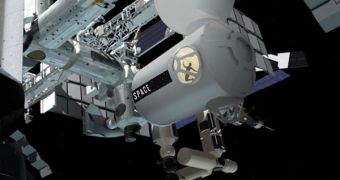Master's degree students from the Imperial College London (ICL) and the Royal College of Art, in the United Kingdom, have recently showcased their space-hotel concept, which takes living in space to a new level. The modular design could readily be attached to the International Space Station (ISS), its designers say, as long as the station is commissioned to remain in Earth's orbit. Life in the hotel would feature robotic servants, specially designed shower-heads, and sensor-laden exercise walls, all included in modules the size of Europe's Columbus, Space informs.
“From personal hygiene to sleeping in zero gravity, we encouraged the students to be completely creative with their solutions so that the living conditions in the world's most isolated hotel could be as comfortable as possible,” space architecture expert Daniele Bedini explains. The scientist worked with NASA and the European Space Agency (ESA) on designing technologically advanced and sustainable outpost ideas for the Moon and Mars. In addition to the modular structure, some students propose the implementation of an inflatable living sphere as well, similar in concept to the one created by Italian space firm Thales Alenia Space.
Perhaps one of the greatest challenges facing astronauts today – and the space tourists of tomorrow – is personal hygiene. Despite occupants' best intentions, using the bathrooms, showers and washing clothes is a tad more complex on a space station hundreds of miles above the ground than it is back home. The students tackled these issues as well, and designed vacuum toilets that were extremely efficient, as well as new types of clothes, which would keep bodily odors to a minimum. Their ideas are not very different from those of the Japanese space agency JAXA, which has already sent odorless clothes to be tested on the station.
“There are no washing machines or tumble dryers in space so we had to design clothes that enabled the skin to breathe, which reduces sweating, smells and the need for clothes to be washed. We achieved this by using natural fibers that breathe and we also made small chest flaps, which let the air in to keep the body cool and comfortable,” ICL Innovation Design Engineering program student Katrin Baumgarten explains. Other students also devised innovative shower booths, which only squirted water in contact with the skin, while other holes absorbed the precious liquid for recycling.

 14 DAY TRIAL //
14 DAY TRIAL //